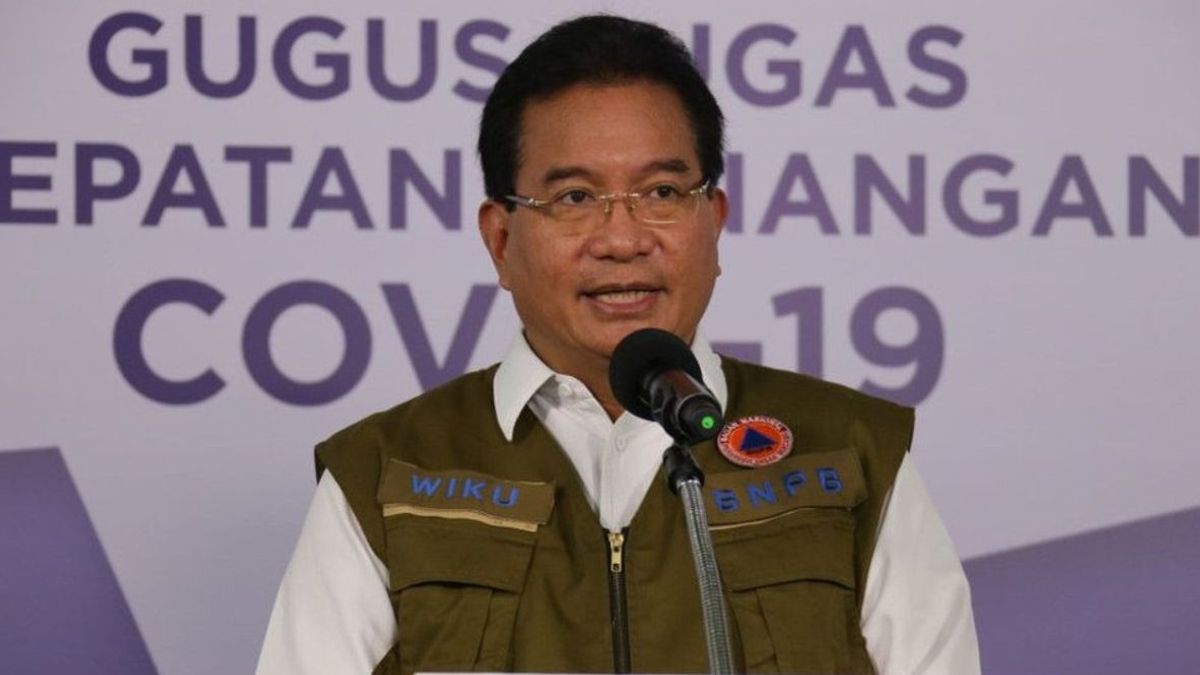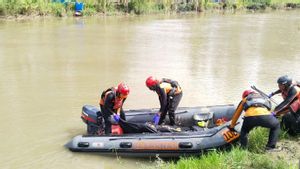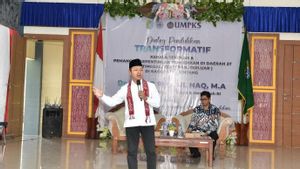JAKARTA - Spokesperson for the Task Force handling COVID-19, Wiku Adisasmito claimed that the Implementation of Restrictions on Community Activities (PPKM) in the fourth week showed positive results, such as a decrease in active cases of COVID-19 and a decrease in the number of filled beds.
"After the first three weeks of PPKM implementation, the numbers still showed an increase, in the fourth week it started to show a percentage decline", Wiku said in a press conference broadcast on the Presidential Secretariat YouTube account, Tuesday, February 9.
He explained, if at the end of the third week of PPKM implementation the percentage of active cases reached 16.24 percent, now in the fourth week the percentage of active cases reached 15.23 percent.
Meanwhile, regarding the filling of beds at the COVID-19 referral hospital, he said that it continued to decline after the PPKM was implemented. In fact, the total decline to date has reached 10.21 percent.
With this positive result, Wiku then asked all parties to maintain these results and not be complacent about the existing results.
In addition, the PPKM policy which has been in effect since January 12 and has been running for four weeks will be continued with PPKM at the micro-level or from the RT level. There is also a micro-based PPKM that has been effective as of today, Tuesday, February 9 to February 22, and all of its policies have been prepared in the Minister of Home Affairs Instruction Number 3 of 2021.
"The policy is taken to extend the micro-based PPKM to the Neighborhood Association (RT)/Citizens Association (RW) level is expected to have an increasingly positive impact on the development of COVID-19 both at the national level and in Java and Bali," he said.
It is known that the micro-scale PPKM is carried out by considering the criteria for the control zone area up to the RT and RW levels. Regions that will implement this micro PPKM are regions in 7 provinces that have implemented PPKM previously. The zoning criteria in question are divided into the green zone, yellow zone, orange zone, and red zone.
1. Green zone
Criteria: No house in one RT has a positive case of COVID-19 in the last 7 days.
Scenarios: active surveillance, all suspects tested, and case monitoring is still carried out regularly.
2. Yellow zone
Criteria: there are 1 to 5 houses with positive cases during the last 7 days.
Scenario: find suspected cases and close contact tracing and then requested self-isolation under close supervision.
3. Orange zone
Criteria: there are 6 to 10 houses with positive cases during the last 7 days.
Scenarios: find suspected cases and tracing close contacts and then asked to self-isolate under strict supervision, closing houses of worship, children's play areas, and other public places except for the essential sector.
4. Red zone
Criteria: there are more than 10 houses with positive cases during the last 7 days.
Scenarios: find suspected cases and close contact tracing; perform self-isolation; close houses of worship, children's play areas, and other public places except for the essential sector; prohibits crowds of more than 3 people; limit entry and exit of RT to a maximum of 20.00 WIB, and eliminate crowd-generating social activities.
Micro PPKM is carried out through the coordination of all elements, starting from the head of RT/RW, village/Head Villages, Satlinmas, Babinsa, Bhabinkamtibnas, Satpol PP, PKK, Posyandu, Dasawisma, community leaders, traditional leaders, religious leaders, youth leaders, extension agents, staff health, youth organizations, and other volunteers.
The coordination, monitoring, and evacuation mechanism of the micro PPKM are carried out by establishing village and family level command posts (Posko).
The English, Chinese, Japanese, Arabic, and French versions are automatically generated by the AI. So there may still be inaccuracies in translating, please always see Indonesian as our main language. (system supported by DigitalSiber.id)













